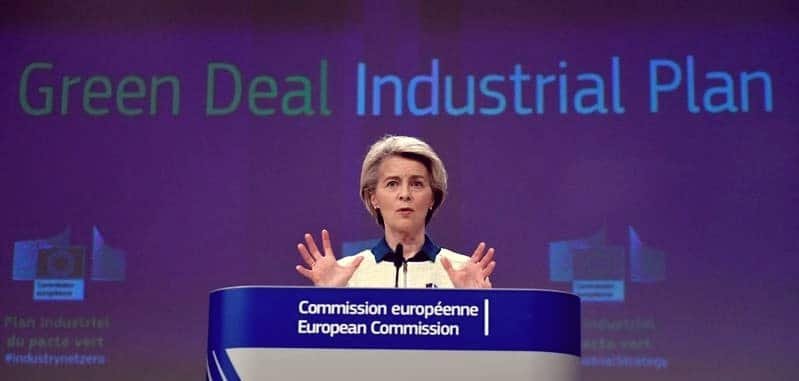The European Commission (EC) set out its $270 billion Green Deal Industrial Plan to support Europe’s race to green transition and boost its net zero industry.
EC President Ursula Von der Leyen announced the plan at the World Economic Forum in Davos, saying it’s a response to the U.S. Inflation Reduction Act. IRA is the leading climate law revealed last year with $369 billion funds to decarbonize industry and transportation in the U.S.
Von der Leyen said in a news conference that:
“Major economies are rightly stepping up investment in net zero industries. What we are looking at is that we have a global playing field… We know that in the next years, the shape of the economy, the net-zero economy, and where it is located will be decided. And we want to be an important part of this net-zero industry that we need globally.
So to keep its competitive edge in the green tech space and net zero, the EU Green Deal is revitalized. The proposed plan will set aside €250 billion ($272 billion) from the existing EU funds aimed at decarbonizing the bloc’s economy.
EU Green Deal Industrial Plan: What’s New?
The original European Green Deal was presented in 2019. It’s a set of policy initiatives by the EC that are fit for cutting net GHG emissions of the union by at least 55% by 2030, compared to 1990 levels.
What’s new with the Green Deal Industrial Plan is that it will ramp up the net zero transformation of the EU industry. The Plan will also ensure that the bloc has access to various technologies and solutions that are key to its net zero transition while bringing more quality jobs.
Moreover, it will help fuel competitiveness, attract investments into net zero and in green industrial innovation.
Overall, the new Green Deal Industrial Plan will create the right conditions for net zero industries to thrive in the EU.
The Four Pillars of the Plan
The Green Deal Industrial Plan has the following key elements:
Fast-tracking permits for clean tech
The first pillar will make regulatory frameworks simpler and permitting faster for clean tech firms.
A major part of that is the creation of a Net-Zero Industry Act that will provide faster permits to technology manufacturers. Examples of these technologies include renewables, carbon capture and storage (CCS), hydrogen production facilities, and batteries.
The EU will also establish the Critical Raw Materials Act to ensure access to materials that are critical for making those green tech. The bloc plans to expand certain technologies by 2030 and specify criteria for strategic clean tech projects.
Faster access to subsidies
Faster access to funding means loosening state aid rules until 2025. This is to enable the EU’s 27 Member States to help with investments in net zero.
Also, the Green Deal Industrial Plan considers allowing countries to draw on existing EU funds so as not to disrupt the internal market’s level playing field. With this plan, a total of 245 billion euros worth of loans and grants will be made available for the green transition.
In the long run, the EC intends to propose a “European Sovereignty Fund” to invest in emerging technologies.
Up-skilling and re-skilling workforce
Transitioning to net zero also requires enough skills in green industries. For example, the battery sector alone projects it needs 800,000 more workers by 2025.
Thus, the EU plans to establish Net-Zero Industry Academies or up-skilling and re-skilling programs in strategic industries. The bloc, in fact, has made several industry partnerships in the automotive, agri-food and other sectors to promote education and vocational training.
The EC is also working to boost recognition of qualifications not just in the EU but also from third countries. The Commission will also support the alignment of public and private funding for skills development, and drive more investment in training.
Open and fair trade
The last pillar is on promoting global, open and fair trade – a vital part of keeping the region’s leadership in net zero technologies. This is important to improve access to raw materials and secure access to new export markets.
The EC, which is responsible for the EU’s trade policy, will continue the development of the bloc’s network of Free Trade Agreements. It also considers making alliances with like-minded partners on raw materials and clean tech. Take for instance its Trade and Technology Council with the U.S.
Part of this plan is dealing with what the Commissions says unfair trading practices common in non-market economies like China.
Other EU Green Initiatives
The Green Deal Industrial Plan complements other green initiatives of the EU that help speed up the transition such as REPowerEU.
REPowerEU is the bloc’s plan to rapidly reduce dependence on Russian fossil fuels and fast-track the green transition. This Plan contains measures that can make such a goal possible by rolling out renewables quickly. At its heart is the Recovery and Resilience Facility (RRF), which supports planning and financing of energy projects and reforms.
Working alongside REPowerEU, the Green Deal Industrial Plan gives guidance on policies to simplify procedures. This is to help unlock more access to funding for clean tech, especially from the private sector.
That should help the industry build more confidence in the future of the EU’s net zero transition.
The EC hopes member states will back its plan at a Feb 9-10 summit. But it faces resistance from some EU members that oppose parts of the plan. They say the plan is “too late, too little”, while others think it “lacks focus” on certain technologies.
Other members, however, welcomed the proposals.

